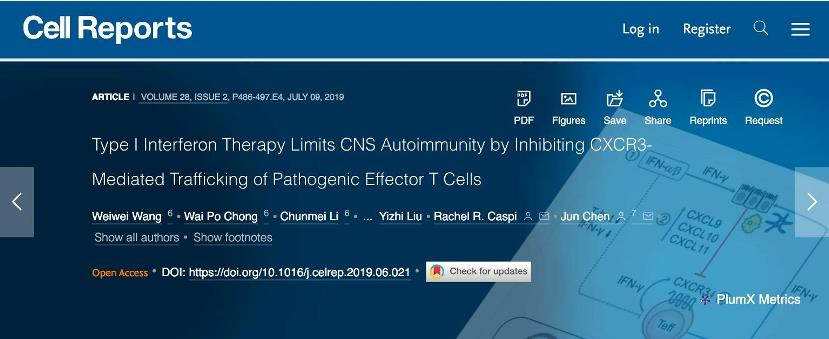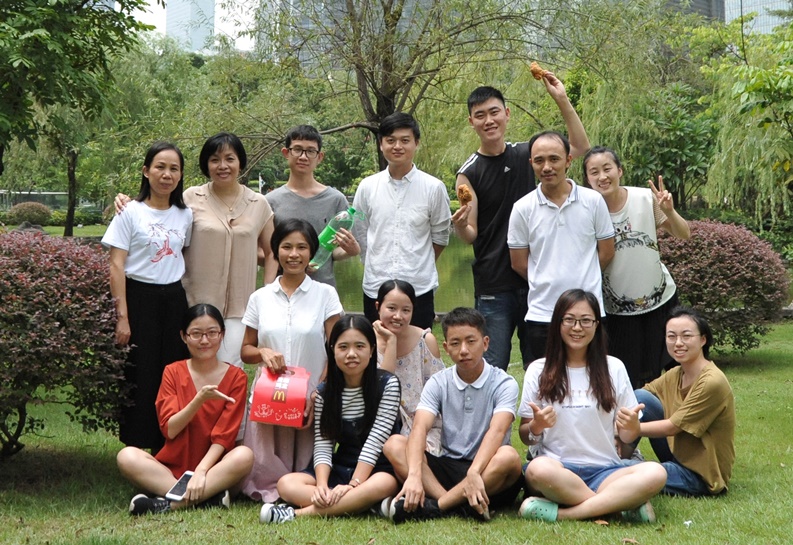Cell Reports: Novel Function of CXCR3 in Immunoregulation of Type I IFN
Resource: Dr. Jun Chen’s team at Zhongshan Ophthalmic Center
Written by: Dr. Jun Chen’s team at Zhongshan Ophthalmic Center
Proofread by: Jiawei Wang
Edited by: Xianjing Wei
On July 9, 2019, an article titled “Type I Interferon Therapy Limits CNS Autoimmunity by Inhibiting CXCR3-Mediated Trafficking of Pathogenic Effector T Cells” was published by Dr. Jun Chen’s team at the Zhongshan Ophthalmic Center (ZOC), Sun Yat-Sen University (SYSU) in Guangzhou in the Cell Reports1. In this article, a previously unrecognized novel function of GαI-coupled CXCR3 signaling for the therapeutic efficacy of CNS autoimmunity with type I interferon (IFN) is revealed.

Uveitis is a group of chronic inflammatory diseases of the eye that is responsible for up to 15% of blindness cases worldwide. Currently, corticosteroids are the main therapeutic agents for the treatment of uveitis although they may cause severe side effects such as cataracts, glaucoma, stomach ulcers and osteoporosis. Novel therapeutic approach are needed.
Type I IFNs (IFN-α/β) were originally discovered as the major effector cytokines of the host immune response to viral infections. Type I IFNs have shown therapeutic potential in central nervous system (CNS) autoimmune diseases, such as uveitis, but the treatment is not always effective in patients and the molecular mechanisms remain largely unknown. Therefore, it is important to have a better understanding of the underlying mechanisms by which type I IFNs exert their immunomodulatory functions.

Dr. Jun Chen (2nd left in the back) and her team at ZOC, SYSU
In this study, using a T cell-transfer model of experimental autoimmune uveitis (EAU), Dr. Chen’s team demonstrates that type I IFN treatment inhibits the migration of IFN-γ-producing pathogenic CD4+ T cells to effector sites. Type I IFN upregulates the expression of the cognate ligands CXCL9, CXCL10 and CXCL11, causing ligand-mediated downregulation of CXCR3 expression and effector T cell retention in the spleen. Accordingly, type I IFN did not alter EAU progression in CXCR3 deficient mice. These in vivo and in vitro findings reveal a non-redundant requirement for CXCR3 signaling for effective treatment of eye-specific autoimmunity with type I IFN.
Importantly, Dr. Chen’s team shows that in uveitis patients, disease exacerbations correlate with reduced serum type I IFN concentrations. Consistent with their observation in animal studies, type I IFN reduces CXCR3 expression and migration by human effector T cells, and these parameters are associated with the therapeutic efficacy of type I IFN in uveitis patients.
Collectively, the studies in animals and humans provide new insight into the molecular basis of type I IFN therapy for eye autoimmune diseases, as active sequestration of autopathogenic CD4+ T cells in the spleen by limiting their CXCR3-dependent migration. These findings suggest that CXCR3 may serve as a critical biomarker for the efficacy of type I IFN therapy in uveitis patients.
Reference
1. Wang W, Chong WP, Li C, Chen Z, Wu S, Zhou H, Wan Y, Chen W, Gery I, Liu Y, Caspi RR*, Chen J**. Type I Interferon Therapy Limits CNS Autoimmunity by Inhibiting CXCR3-Mediated Trafficking of Pathogenic Effector T Cells. Cell Reports. 2019 Jul 9;28(2):486-497.
Link: https://www.cell.com/cell-reports/fulltext/S2211-1247(19)30787-9
